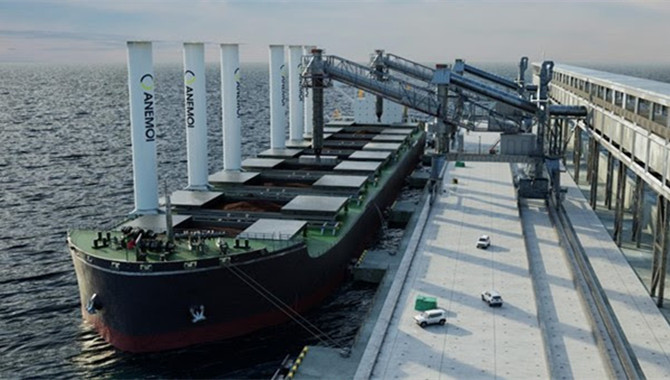Lloyd's Register has granted Approval in Principle (AIP) for an SDARI (Shanghai Merchant Ship Design and Research Institute) designed 210,000 DWT Newcastlemax bulk carrier installed with Anemoi Rotor Sails to significantly improve efficiency and reduce environmental impact.
The Newcastlemax AIP is part of a pioneering joint development project (JDP), signed in 2020, with Anemoi Marine Technologies, Lloyd's Register, and SDARI and brings together the OEM, classification society, ship designer, and ship owner to develop a series of energy-efficient vessel designs equipped with Rotor Sails. Oldendorff Carriers is the shipowner partner for this Newcastlemax design
Mark Darley, Global Marine and Offshore Director at Lloyds Register said:
“LR is committed to working together for a safe, sustainable and thriving ocean economy. The fitting of Rotor Sails on this bulk carrier, as part of our JDP with Anemoi, SDARI and Oldendorff Carriers, will considerably improve the vessel's efficiency and is a clear example of how energy saving devices can support the maritime industry with impending EEXI and CII regulations.”
Director Innovation, Torsten Barenthin, of Oldendorff Carriers commented: “This has been an important project as part of Oldendorff Carriers' commitment towards Getting to Zero. The results have demonstrated the impressive impact Rotor Sails have on regulatory obligations, which is a key consideration, in addition to the emission reduction benefits. We will continue our assessment of Anemoi's technology for our fleet.”
The AIP covers the structural integration for a ship design with six 5x30m Rotor Sails and Anemoi's Rail Deployment System, which sees the Rotor Sails move transversely across the deck to avoid inference with cargo handling; and the structural integration for a ship design with four of Anemoi's folding (tilting) 5x35m Rotor Sails.

Source: Anemoi
Lloyd's Register has assessed the calculation used to estimate the impact the Rotor Sails will have on the Energy Efficiency Design Index (EEDI) and validated that the newbuild Newcastlemax would have its EEDI score reduced from 1.92 to 1.37 (29% reduction) by installing six 5x30m Rail Rotor Sails and 1.47 (23% reduction) by installing four 5x35m Folding Rotor Sails.
Nick Contopoulos, Anemoi's Chief Operating Officer, said: “We're very pleased with the outcome for the first vessel included in the JDP. EEDI is a significant driver for the installation of Rotor Sail technology and, as we grow closer to the implementation of EEXI and CII, they too become important incentives for Rotor Sails, along with the overarching reductions in fuel consumption and associated emissions. To have the impact pre-validated by LR is a key step in continuing to prove the importance of our technology in the context of the decarbonisation of shipping. Both design configurations (folding and rail) of Rotor Sails for a Newcastlemax vessel are available to order now.”
Other vessels included in the JDP and to follow are an 85,000 DWT Bulk Carrier, a very large ore carrier (VLOC), a 114,000 DWT Aframax tanker, a 50,000 DWT MR tanker and a very large crude carrier (VLCC).
Wang Gang Yi, Chief Engineer of SDARI said: “This collaboration with Anemoi, LR and Oldendorff demonstrates the great potential of Rotor Sail technology to drive significant reduction in emissions and provide ship owners and charterers with available solutions for regulatory compliance, as we move towards 2030 and beyond. We are very pleased to see the market moving and starting to place commercial orders for this renewable technology.”
Rotor Sails are modern mechanical sails comprised of tall cylinders which, when driven to spin, harness the renewable power of the wind to provide auxiliary propulsion to vessels and can reduce overall fuel consumption and lower harmful emissions by 5-30%. The technology can be used in combination with other technologies to further increase efficiency and reduce fuel consumption of all fuel types including incoming future fuels.
Source: Anemoi
The opinions expressed herein are the author's and not necessarily those of The Xinde Marine News.
Please Contact Us at:
media@xindemarine.com


 Ningbo Containerized Freight Index Weekly Commentar
Ningbo Containerized Freight Index Weekly Commentar  Ningbo Containerized Freight Index Weekly Commentar
Ningbo Containerized Freight Index Weekly Commentar  Ningbo Containerized Freight Index Weekly Commentar
Ningbo Containerized Freight Index Weekly Commentar  BIMCO Shipping Number of the Week: Bulker newbuildi
BIMCO Shipping Number of the Week: Bulker newbuildi  Ningbo Containerized Freight Index Weekly Commentar
Ningbo Containerized Freight Index Weekly Commentar  Ningbo Containerized Freight Index Weekly Commentar
Ningbo Containerized Freight Index Weekly Commentar